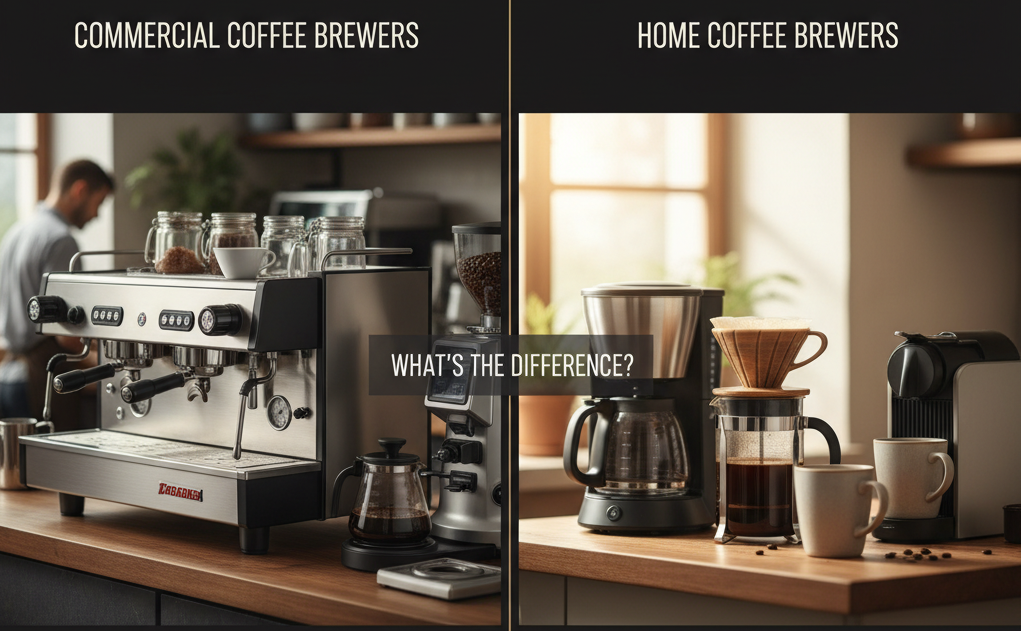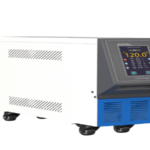Advertisement
Coffee is more than just a beverage; it’s a ritual that fuels mornings, sparks conversations, and keeps workplaces running smoothly. For some, a simple home brewer does the trick, while for others, especially in bustling cafes or offices, only a commercial brewer can handle the demand. But what truly separates the two?
When exploring professional coffee brewers, you’ll notice significant differences in capacity, durability, and performance compared to machines made for home use. Each has its place, depending on your needs, lifestyle, or business setup. This blog explores the main differences between commercial and home brewers so you can make an informed choice that suits your coffee goals.
Why the Brewer You Choose Matters
The machine you brew with shapes every aspect of your coffee experience, from taste to consistency and convenience. A brewer designed for a busy office or cafe can deliver dozens of cups within minutes, while a home brewer may focus more on ease of use and compact size. Choosing the wrong machine can leave you frustrated, whether it’s because of slow service in a cafe or the unnecessary bulk of a commercial unit in a small kitchen.
Defining Commercial Coffee Brewers
Commercial brewers are built for volume and reliability. These machines are designed to serve multiple people in a short time. You’ll find them in restaurants, hotels, offices, and cafes where speed and consistency are non-negotiable.
Unlike home brewers, they are engineered with stronger components, large water reservoirs, and advanced heating systems. The focus is on producing a large number of cups quickly, without compromising on flavor. They also integrate features such as precise temperature control, hot water spouts, and multiple brew settings to cater to the diverse preferences of coffee drinkers.
What Are Home Coffee Brewers?
Home brewers are compact machines designed for individual or family use. They prioritize convenience, affordability, and smaller batch sizes. While they may not handle dozens of cups at once, they often excel at making just the right amount of coffee with minimal effort.
Most home brewers are user-friendly, often equipped with timers, auto-shutoff features, and simple controls. They’re ideal for morning routines, providing a consistent brew without requiring professional skills.
Key Differences Between Commercial and Home Brewers
Choosing between a commercial coffee brewer and a home brewer isn’t just about size; it’s about function, performance, and purpose. Each type of machine is designed with different users in mind, which affects everything from brewing speed to durability. Understanding these differences helps you decide which one best fits your lifestyle or business needs.
And here are the main differences you should know:
-
Brewing Capacity
Commercial brewers can brew anywhere from several liters to multiple gallons at a time, making them suitable for offices, cafes, or events.
While home brewers typically brew 4–12 cups at a time, enough for individuals or small households.
This difference alone can determine which brewer is right for you. A busy workplace can’t rely on a small home brewer, while a household would find a commercial brewer excessive.
-
Build Quality and Durability
Commercial brewers utilize heavy-duty materials, including stainless steel and industrial-grade components. They are designed for long hours of operation and frequent use.
Home brewers, while durable, are usually made with lighter materials. They are expected to run a few times a day, not nonstop. As a result, commercial machines often last longer when maintained properly.
-
Brewing Speed
Speed is critical in commercial settings. These brewers can produce full pots in just a few minutes and keep the coffee hot for extended periods.
Home brewers are slower in comparison, focusing on making smaller, fresher batches. That’s perfect when you’re only serving yourself or your family, but it may cause delays in high-demand environments.
-
Features and Controls
Commercial machines often come with advanced features:
- Multiple warming plates or airpots.
- Hot water taps for tea or instant drinks.
- Programmable brew strength and volume.
- Continuous water lines for non-stop brewing.
Home brewers, on the other hand, keep things simple. They may offer programmable start times, basic brew strength settings, and sometimes single-serve options, but they don’t have the same versatility as commercial models.
-
Maintenance and Cleaning
Commercial brewers are designed with easy maintenance in mind. Many have accessible components for quick servicing and cleaning routines built for staff use.
Home brewers require less intensive care but may not be as easy to repair if something breaks. Often, replacement is more cost-effective than repair.
-
Price Range
Commercial brewers prices range widely, often starting around a few hundred dollars and reaching into the thousands for high-end models.
Home brewers typically cost between $50 and $300, with premium models going slightly higher.
The investment in a commercial brewer pays off for businesses that rely on coffee sales or employee satisfaction, while home users can achieve great results without breaking the bank.
Who Needs a Commercial Brewer?
If you run a cafe, restaurant, hotel, or even a busy office, a commercial brewer is almost mandatory. It ensures:
- Consistency: Every cup tastes the same, no matter how many are brewed.
- Speed: Large volumes can be brewed quickly to keep customers or employees satisfied.
- Reliability: Heavy-duty construction reduces downtime.
Who Should Stick With a Home Brewer?
Home brewers are ideal for individuals or families who require a few cups of coffee each day. They suit:
- People who value affordability and convenience.
- Small households with moderate coffee consumption.
- Those who prefer compact appliances that don’t take up much space.
When Does It Make Sense to Upgrade?
A common question is when a home setup should move into commercial territory. The answer depends on usage. If your home gatherings regularly involve serving ten or more people at once, or if your office relies heavily on coffee, upgrading may save time and stress in the long run.
Advantages of Commercial Brewers
Here are a few standout benefits:
- High Volume Output: Ideal for heavy demand.
- Customizability: More brew strength and size options.
- Durability: Long-lasting, even with daily use.
- Professional Image: Adds credibility to a cafe or business environment.
Advantages of Home Brewers
For households, home brewers offer their own unique strengths:
- Affordability: Lower cost makes them accessible to everyone.
- Ease of Use: Simple controls and features.
- Compact Size: Fits into small kitchens without hassle.
- Freshness: Smaller batches mean fresher coffee every time.
Making the Right Choice
The decision comes down to balancing need, budget, and space. Ask yourself:
- How many people will be served daily?
- How important is speed and consistency?
- What budget is realistic for your needs?
By answering these questions, you can determine whether a home brewer is sufficient or whether a commercial machine is the more prudent long-term investment.
Tips for Maintaining Your Brewer
Regardless of which brewer you choose, proper maintenance is key:
- Descale regularly to prevent mineral buildup.
- Clean carafes and baskets daily.
- Check water quality to extend machine life.
- Replace filters and parts as recommended by the manufacturer.
These simple habits keep your brewer running smoothly and ensure every cup tastes great.
Conclusion
Commercial and home brewers serve the same purpose, delivering coffee, but they operate in very different ways. Commercial units focus on volume, speed, and durability, while home brewers prioritize convenience, affordability, and compact design.
Ultimately, the right choice depends on your setting. A bustling cafe or office needs the heavy-duty support of a commercial brewer, while households benefit more from the simplicity of a home brewer.












